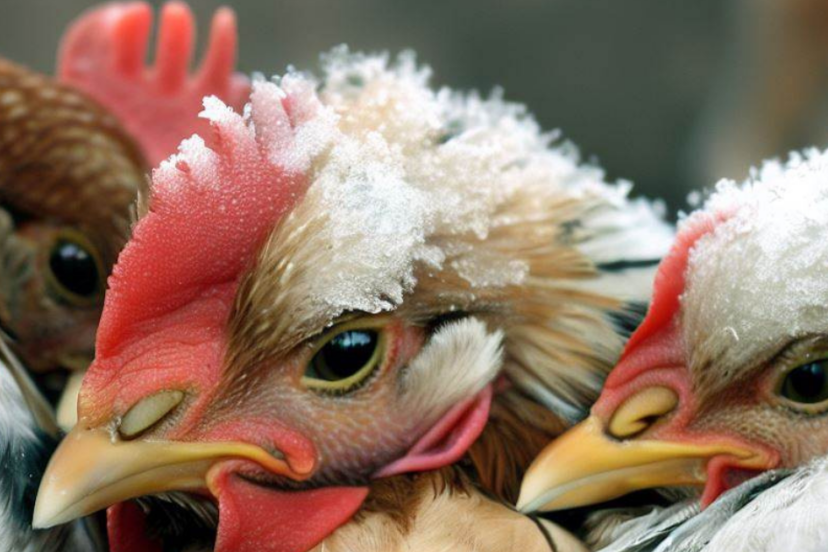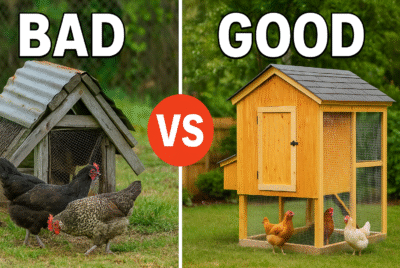Keeping Chickens in Winter: How Cold Can Chickens Tolerate
A Comprehensive Guide to Ensure the Well-being of Your Flock
I understand the challenges that winter brings for backyard chicken keepers. The cold temperatures, frostbite risks, limited foraging opportunities, and increased predator activity require special attention to ensure the well-being of your feathered friends. In this comprehensive guide, I will provide you with invaluable insights and practical suggestions to keep your chickens happy, healthy, and thriving during the winter months.
Implementing Safety Measures
Winter poses unique safety risks for chickens, including predators seeking food sources. We’ll discuss strategies for predator-proofing your coop and run, securing entrances, and using deterrents to keep your flock safe. You’ll learn about proper fencing, reinforced coop construction, predator-resistant materials, and the importance of regular inspections to identify and address vulnerabilities.
Creating a Warm and Cozy Coop
Maintaining the right temperature in the coop is crucial for your chickens’ well-being during the cold season. We’ll explore various heating options, including heat lamps, heated perches, and safe space heaters, while emphasizing the importance of ventilation to prevent condensation and respiratory issues. You’ll gain insights into insulation techniques, proper bedding choices, and effective coop design to provide a warm and comfortable environment for your flock.
Managing Temperature and Humidity
Temperature fluctuations and excessive humidity can be detrimental to your chickens’ health in winter. We’ll delve into the optimal temperature range for chickens, the impact of humidity on respiratory health, and how to maintain a balanced and comfortable microclimate in the coop. From draft prevention and moisture control to adequate ventilation and moisture-absorbent bedding, you’ll discover practical ways to manage temperature and humidity for the well-being of your flock.
Nutritional Considerations
Proper nutrition plays a vital role in supporting your chickens’ health and well-being throughout the winter season. We’ll discuss dietary requirements, feeding strategies, and the importance of a balanced and nutritious diet to keep your chickens in optimal condition. You’ll learn about specific foods and supplements that can boost their immune system, provide essential nutrients, and support egg production during the colder months.
Frostbite Prevention and Treatment
Frostbite is a common concern in winter, particularly for chickens’ combs, wattles, and feet. We’ll explore the causes, symptoms, and preventive measures to minimize the risk of frostbite. From applying protective salves and providing insulated roosts to improving coop ventilation and using bedding with good moisture-absorbing properties, you’ll discover effective ways to prevent and treat frostbite in your flock.
Maintaining Hydration
Water is essential for your chickens’ health, even in winter when freezing temperatures can make it challenging for them to access fresh water. We’ll discuss strategies to prevent water from freezing, such as heated waterers, insulated containers, and regular water checks. You’ll also learn about alternative hydration sources, including warm water treats and moisture-rich foods, to ensure your flock remains properly hydrated during the winter season.
Enrichment and Entertainment
Winter can limit your chickens’ opportunities for outdoor foraging and activities. We’ll explore various enrichment options to keep them mentally stimulated and physically active during the colder months. From providing toys, treats, and puzzles to creating indoor dust-bathing areas and offering alternative foraging opportunities, you’ll discover creative ways to prevent boredom and promote natural behaviors in your flock.
How Cold Can Chickens Tolerate
Assessing Cold Conditions
Promoting Chicken Comfort in Cold Weather
Health and Care Considerations
Seeking Professional Advice
Sometimes, despite your best efforts, unexpected challenges may arise during winter. It’s important to recognize when professional guidance is needed. We’ll discuss common health issues, the importance of observing your chickens closely, and when to seek veterinary care. Additionally, we’ll explore the resources available, such as local poultry associations, veterinarians, and online forums, to connect with experienced professionals and fellow chicken keepers who can offer valuable advice and support.
Top 10 Cold-Tolerant Chicken Breeds for Chilly Climates
When it comes to keeping chickens in cold climates, it’s crucial to choose breeds that can withstand the frigid temperatures and thrive in chilly conditions. As an experienced chicken enthusiast, I understand the challenges of raising chickens in low temperatures. In this article, I will introduce you to the top 10 cold-tolerant chicken breeds, starting from the ones that can handle the lowest temperatures to those that can withstand milder cold spells. Let’s explore these hardy breeds and their preferred housing solutions for optimal winter care.
1. Siberian: Enduring Extreme Cold
– Origin: Russia
– Lowers Temperature Range: Can withstand extremely cold temperatures as low as -40°F (-40°C)
– Preferred Housing Solution: Well-insulated coops with excellent ventilation, deep bedding, and protection from strong winds.
2. Buff Orpington: Hardy and Resilient
– Origin: England
– Lowers Temperature Range: Can tolerate temperatures as low as -20°F (-29°C)
– Preferred Housing Solution: Well-insulated coops with adequate ventilation and protection from drafts.
3. Wyandotte: Tough and Cold-Hardy
– Origin: United States
– Lowers Temperature Range: Can endure temperatures as low as -20°F (-29°C)
– Preferred Housing Solution: Insulated coops with dry bedding, adequate ventilation, and access to a covered outdoor area.
4. Brahma: Thriving in Harsh Conditions
– Origin: United States/Asia
– Lowers Temperature Range: Can withstand temperatures as low as -20°F (-29°C)
– Preferred Housing Solution: Coops with proper insulation, thick bedding, and protection from cold winds.
5. Rhode Island Red: Cold-Resistant and Reliable
– Origin: United States
– Lowers Temperature Range: Can withstand temperatures as low as -10°F (-23°C)
– Preferred Housing Solution: Coops with good insulation, sufficient bedding, and access to a protected outdoor area.
6. Plymouth Rock: Cold-Hardy Heritage Breed
– Origin: United States
– Lowers Temperature Range: Can handle temperatures as low as -10°F (-23°C)
– Preferred Housing Solution: Coops with proper insulation and draft-free design, along with access to a sheltered outdoor run.
7. Ameraucana: Charming and Cold-Tolerant
– Origin: United States
– Lowers Temperature Range: Can handle temperatures as low as -10°F (-23°C)
– Preferred Housing Solution: Well-insulated coops with good ventilation, dry bedding, and access to a covered outdoor space.
8. Orpington: Withstanding the Cold
– Origin: England
– Lowers Temperature Range: Can endure temperatures as low as -10°F (-23°C)
– Preferred Housing Solution: Coops with proper insulation, draft-free design, and access to a covered outdoor run.
9. Sussex: Adaptable to Chilly Climates
– Origin: England
– Lowers Temperature Range: Can tolerate temperatures as low as -5°F (-20°C)
– Preferred Housing Solution: Well-insulated coops with good ventilation and access to a protected outdoor run.
10. Hamburg: Cold-Hardy and Energetic
– Origin: Germany
– Lowers Temperature Range: Can tolerate temperatures as low as -5°F (-20°C)
– Preferred Housing Solution: Coops with good insulation, dry bedding, and access to a protected outdoor area.
By choosing any of these top 10 cold-tolerant chicken breeds, you can provide your feathered friends with the best chances of thriving in chilly weather.
Conclusion
FAQs
1. Can chickens survive winter without heat?
Yes, chickens are naturally equipped to handle cold temperatures. With proper shelter, insulation, and protection from drafts, most chicken breeds can survive winter without artificial heat sources. However, it’s essential to provide a well-insulated coop and bedding materials to help them stay warm.
2. What temperature can chickens tolerate in winter?
Chickens are generally comfortable in temperatures as low as 20°F (-6°C). However, individual tolerance may vary based on breed, age, and overall health. Providing a draft-free and dry environment is crucial to help them withstand colder temperatures.
3. Can chickens be outside in the winter?
Yes, chickens can be outside in the winter if they have access to a dry, sheltered area. Ensure they have protection from snow, wind, and wet conditions. Monitor them closely for signs of discomfort, and consider limiting their outdoor time during extreme weather.
4. Can chickens free range in the winter?
Free-ranging chickens in winter is possible, but it depends on the weather conditions and the availability of suitable foraging areas. It’s essential to provide them with a well-protected and dry outdoor space to prevent exposure to harsh elements.
5. Can chickens lay eggs in the winter?
Yes, chickens can lay eggs in the winter. However, egg production tends to decrease due to shorter daylight hours. Supplementing their diet with a balanced feed and providing artificial lighting can help stimulate egg-laying during this time.
*We may earn a commission from purchases made through our links, at no cost to you. This does not affect our product recommendations. Please see our disclosure to learn more.




